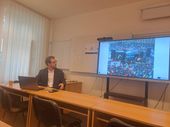Search
Ukraine's European Path
Historical Legacy, Regional Development, and Future Integration
Event details
The event is a two-part academic lecture series hosted in Bratislava, organized within the framework of the EU-funded project “Project Management for EU Urban Transformation in the Context of Climate Change and Energy Transition” (PM4U), with the contribution of the AESOP Thematic Group “Transboundary Planning and Governance”. It focuses on Ukraine’s path toward European integration, offering a comprehensive exploration of the country’s regional development, modern history, and evolving identity amidst geopolitical challenges.
Bringing together academics, policymakers, and practitioners, the event provides a platform for analyzing Ukraine’s European trajectory in light of historical, political, and military developments, particularly in the context of Russian aggression. The lectures are aimed at fostering critical dialogue, drawing lessons for EU cohesion policies, and deepening understanding of Ukraine’s transformation.
Through expert-led sessions, participants will examine key agreements, the effects of war, the resilience of Ukrainian society, and current EU accession efforts, contributing to broader discussions on democratic transformation and post-war development in Eastern Europe.
Lecture 1: Eurointegration and Regional Development of Ukraine
This lecture examines Ukraine’s trajectory toward European integration within a broader geopolitical and historical context, emphasizing how EU orientation has influenced regional development strategies amid ongoing external aggression. Key lessons will be discussed in the context of governance, cohesion policy, and sustainable transformation.
Target Audience:
- Lecturers and researchers in regional development, political science, EU studies
- Urban planners and project managers
- Public sector professionals involved in EU policy and regional governance
- Bachelor's, Master’s and PhD students in related disciplines
Key Topics:
- The origins of EU–Ukraine cooperation and the 1994 Partnership and Cooperation Agreement
- Regional development under EU influence
- The impact of Russian aggression on governance and planning
- Ukraine’s contribution to EU cohesion and policy reflections
- Prospects for Ukraine’s regional transformation and EU membership
Terms and Conditions:
- Lecture date and time: September 30, 2025; 4-6 PM CET (Bratislava time),
- Speaker: Dr.Ivan Balykin, University of Mannheim, Germany
- Lecture format: Hybrid (online and onsite)
- Registration: Closed
- Venue (onsite part):The meeting room on the 3rd floor of Institute of Management, Slovak University of Technology in Bratislava, Vazovova 5, Bratislava, 812 43 (How to find the room)
- Participation: Free of charge
- Official language: English
- Certificate of Participation: A certificate of participation will be provided to attendees.
- Link to the online participation: https://knu-ua.zoom.us/j/82948336315?pwd=50dIYYYqatTqbuG57WgFUjsrvInrgd.1
Lecture 2: Modern History of Ukraine: The Path to Eurointegration
This lecture provides an in-depth look at Ukraine’s modern history since independence, exploring the political and military challenges that shaped its identity and aspirations. Emphasis will be placed on civic resilience, the impact of Russian aggression, and Ukraine’s evolving relationship with the European Union.
Target Audience:
- Historians, political scientists, and researchers in Eastern European studies
- Educators and students of EU enlargement and post-socialist transitions
- Practitioners in international relations and democracy-building
- Civil servants and analysts engaged in strategic planning or governance
Key Topics:
- Key historical milestones from 1991 to 2025
- The EU–Ukraine Association Agreement: significance and consequences
- Russian strategy and Ukrainian state-building
- The 2022 full-scale invasion and its implications
- Ukrainian national identity, resilience, and EU accession process
Terms and Conditions:
- Lecture date: October 2, 2025; 4:30-6:30 PM CET (Bratislava time)
- Speaker: Dr.Ivan Balykin, University of Mannheim, Germany
- Lecture format: Hybrid (online and onsite)
- Registration: Closed
- Venue (onsite part): The meeting room on the 3rd floor of Institute of Management, Slovak University of Technology in Bratislava, Vazovova 5, Bratislava, 812 43 (How to find the room)
- Participation: Free of charge
- Official language: English
- Certificate of Participation: A certificate of participation will be provided to attendees.
- Link to the online participation: https://knu-ua.zoom.us/j/86587450652?pwd=6AcofKkV8qk3bJIY0HUPd8rPulIcHP.1
About Speaker
With over 15 years of academic and public sector experience, Dr. Balykin has authored more than 45 scientific publications and has taught in leading universities in Ukraine and Germany. His research focuses on Ukraine’s modern statehood, democratic development, and the impact of Russian aggression on national identity and regional transformation. He is actively involved in educational reform, civic initiatives, and international academic collaboration.
Lecture Recordings
Access the video recordings of each lecture via the links below:
- Lecture 1: Eurointegration and Regional Development of Ukraine.
- Lecture 2: Modern History of Ukraine: The Path to Eurointegration.





